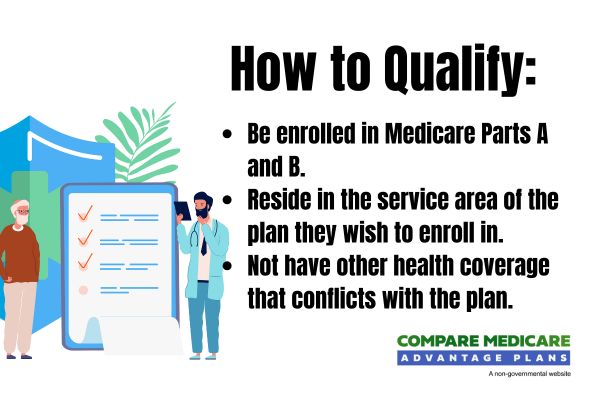




Medicare Advantage Plans Vermont 2026
Looking for updates on Medicare Advantage Plans Vermont
Key Takeaways
- Vermont Medicare Advantage Plans offer comprehensive coverage that includes additional benefits such as vision, dental, and hearing services, aimed at enhancing members’ overall healthcare experience.
- Different types of plans are available, including HMO, PPO, and Special Needs Plans (SNPs), each with unique features catering to varying healthcare needs and preferences.
- Enrollment in these plans requires being enrolled in Medicare Parts A and B, with an annual enrollment window and potential special enrollment periods, emphasizing the importance of understanding the costs and benefits associated with different plans.
Compare Plans in One Step!
Enter Zip Code
Understanding Vermont Medicare Advantage Plans 2026

Vermont offers all-in-one Medicare Advantage plans designed specifically for its residents, providing additional benefits alongside standard Medicare coverage. These plans typically encompass a broad range of services, including prescription drugs, vision, hearing, and dental services, thereby enhancing the overall healthcare experience for members.
Moreover, these plans encourage preventive care through wellness programs that reward members for completing health-related activities. Imagine earning rewards just for attending your annual health check-ups – it’s a win-win situation for your health and your wallet.
Additionally, some plans, like the Tribute PPO, are tailored specifically for veterans, offering flexibility and benefits that extend beyond typical VA coverage. This makes Vermont Medicare Advantage Plans a versatile and appealing option for many, thanks to the added layers of coverage and support they provide.
Types of Vermont Medicare Advantage Plans Available
When it comes to Medicare Advantage Plans in Vermont, there is no one-size-fits-all solution. Instead, residents have several options to choose from, including Health Maintenance Organization (HMO) plans, Preferred Provider Organization (PPO) plans, and Special Needs Plans (SNPs).
Each type of plan offers different benefits and coverage options, catering to the diverse needs of Vermont residents and the state.
HMO Plans
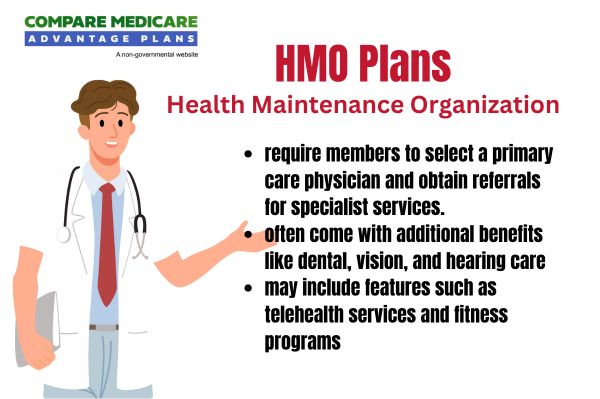
HMO plans are among the most popular Medicare Advantage Plans available. These plans typically require members to use a network of doctors and hospitals to receive coverage, except in emergencies. This network-based approach allows for coordinated care, which can lead to better health outcomes and lower costs.
One of the key benefits of HMO plans is their focus on preventive care. Regular check-ups and screenings under these plans help detect potential health issues early, preventing them from becoming major problems. This proactive approach to health management is particularly beneficial for seniors who may have multiple health concerns.
PPO Plans
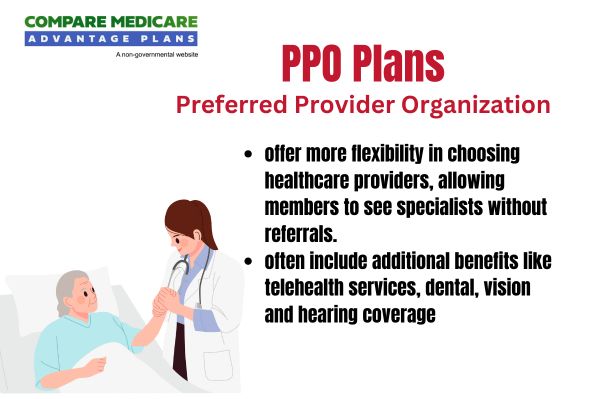
PPO plans offer more flexibility compared to HMO plans. Members can see any doctor or specialist without needing a referral, and they can receive care from providers both in and out of the plan’s network. This flexibility makes PPO plans an attractive option for those who want more freedom in choosing their healthcare providers.
However, this flexibility comes at a cost. PPO plans typically have higher premiums and out-of-pocket expenses compared to HMO plans. Despite this, the added choice and convenience can be worth it for those who value the ability to see any doctor they choose.
Special Needs Plans (SNPs)
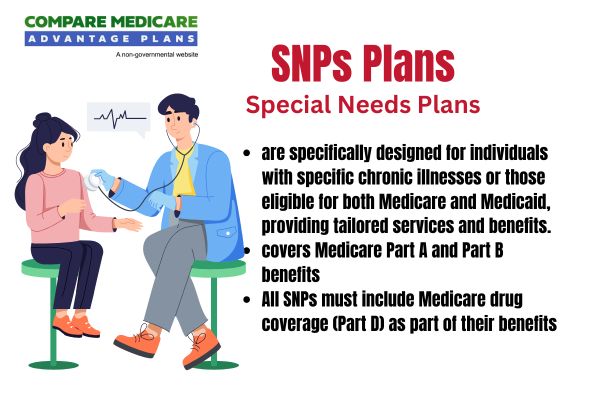
Special Needs Plans (SNPs) are tailored to meet the specific needs of individuals with certain chronic conditions, disabilities, or those who are dual-eligible for Medicare and Medicaid. These plans offer targeted benefits, provider choices, and drug formularies designed to best meet the specific needs of the groups they serve.
SNPs provide an extra layer of support for managing chronic health issues, often including specialized care coordination and access to a network of providers skilled in treating specific conditions. This specialized focus can make a significant difference in the quality of care and overall health outcomes for members.
Overview of Vermont Medicare Advantage
Vermont Medicare Advantage Plans offer a comprehensive alternative to Original Medicare, combining coverage for hospital, medical, and often prescription drug services into one plan. These plans are designed to provide more complete care, often including additional benefits not covered by Original Medicare, such as vision, dental, and wellness programs.
This holistic approach to healthcare not only simplifies the process for members but also helps ensure that all aspects of their health are addressed. With a focus on preventive care and chronic disease management, Vermont Medicare Advantage Plans aim to improve overall health outcomes and quality of life for their members.
Covered Services and Benefits
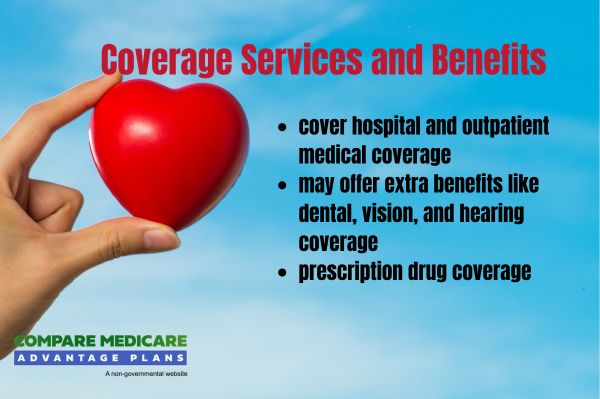
Vermont Medicare Advantage Plans cover a wide range of essential health services. These include hospitalization, outpatient care, preventive services, and emergency care, ensuring that members have access to necessary medical treatments.
In addition to these core services, many plans offer benefits for vision and hearing, including coverage for exams and aids like glasses and hearing aids. Dental coverage is also typically included, allowing for services such as cleanings, fillings, and certain surgical procedures.
Preventive care is a significant focus, with immunizations like flu and COVID-19 vaccines often provided at no cost. Additionally, diabetes management is well-supported, with covered supplies such as test strips and insulin, and some plans even offer $0 copays for certain medications. These comprehensive benefits ensure that members can maintain their health more effectively and affordably.
Key Benefits of Vermont Medicare Advantage Plans 2026
One of the standout benefits of Vermont Medicare Advantage Plans is the availability of zero-premium options, making them financially accessible for many seniors. These plans often include additional services such as vision and dental coverage, which are typically not included in Original Medicare.
Members also benefit from wellness programs that reward healthy activities, comprehensive coverage for chronic conditions, and access to a wide network of providers. These features make Vermont Medicare Advantage Plans a valuable choice for those looking to maximize their healthcare benefits without breaking the bank.
Additional Health Services
Beyond the standard medical coverage, Vermont Medicare Advantage Plans offer various additional health services. These include dental, vision, and hearing benefits, which enhance the overall healthcare options for members.
Members enrolled in these plans can also receive a quarterly allowance for over-the-counter products, helping them manage their healthcare expenses more effectively. Preventive immunizations, such as flu and shingles vaccines, are provided at no cost, emphasizing the importance of preventive care.
Moreover, diabetes care is a significant focus, with $0 copays for diabetic supplies and screenings, and free retinopathy exams offered under most plans. These additional services ensure that members receive comprehensive care tailored to their specific health needs.
Enrollment Process for Vermont Medicare Advantage Plans 2026
To enroll in a Medicare Advantage plan, individuals must first be enrolled in Medicare Parts A and B.
It’s also important to select a new plan if your current one is discontinued to ensure continuous contact coverage and new plans, along with other plans for future needs.
When to Enroll
The enrollment window for Medicare Advantage typically occurs annually from October 15 to December 7. This period allows individuals to review their options and select the plan that best meets their needs. Coverage for plans generally begins on January 1 following the enrollment period.
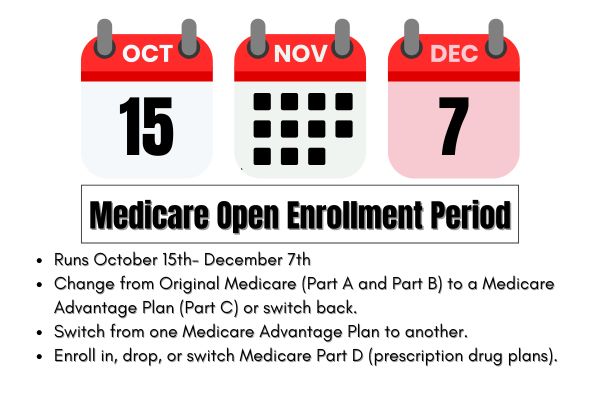
There are also Special Enrollment Periods for those who meet certain conditions, offering flexible enrollment opportunities beyond the standard timeframe. It’s crucial to enroll in Medicare Parts A and B as soon as you become eligible to avoid late enrollment penalties.
Different Enrollment Periods
The primary enrollment period for Medicare begins three months before an individual turns 65 and lasts for seven months. There are also specific enrollment periods for Medicare Advantage, including the Initial Enrollment Period and the Special Enrollment Period.
OEP, AEP, Special Enrollment
The Annual Election Period (AEP) allows beneficiaries to switch Medicare Advantage plans or return to Original Medicare each year from October 15 to December 7.
Additionally, the Open Enrollment Period provides another opportunity to switch plans or enroll in a Medicare Advantage plan each year.
Costs Associated with Vermont Medicare Advantage Plans 2026
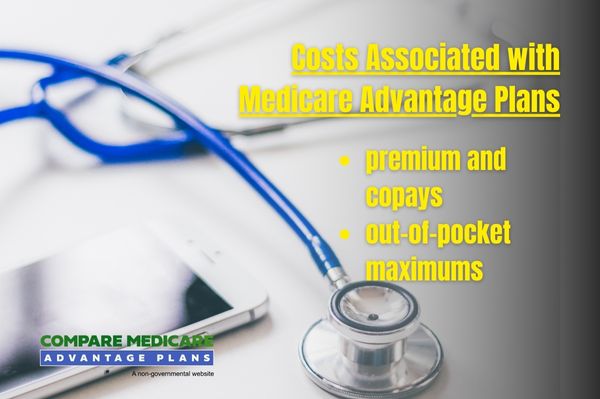
The costs associated with Vermont Medicare Advantage Plans can vary widely. These costs typically include premiums, co-pays, and out-of-pocket maximums, with details depending on the specific plan chosen.
Premiums and Co-Pays
Premiums for Medicare Advantage Plans can range from $0 to a higher monthly amount, depending on the coverage provided. Co-pays are the amounts you pay for each service, such as doctor visits or prescriptions, and they can vary based on the plan’s structure.
Understanding these costs is crucial for budgeting and ensuring that the plan chosen fits your financial situation. It’s always a good idea to review the specific costs associated with each plan to make an informed decision.
Out-of-Pocket Maximums
Out-of-pocket maximums are a significant feature of Medicare Advantage Plans. These caps provide financial protection by limiting the total amount you will spend on covered services in a given year.
This can be particularly beneficial in managing unexpected healthcare expenses.
Covered Services and Benefits
Medicare Advantage Plans in Vermont cover a comprehensive range of services. These include hospitalization, outpatient care, preventive services, and emergency care, ensuring members have access to necessary healthcare.
Additionally, many plans offer benefits for vision, hearing, and dental services, as well as preventive immunizations and diabetes management. These benefits provide a robust safety net for members, helping them maintain their health more effectively.
How to Qualify for Vermont Medicare Advantage Plans 2026
Enrollment in Medicare Parts A and B is required to qualify for Vermont Medicare Advantage Plans. This ensures that they have the necessary foundational coverage to build upon with additional benefits provided by Medicare Advantage.
Contracted Network and Access to Care
Medicare Advantage Plans typically establish networks of providers, which include doctors, hospitals, and specialists that members are required to use to receive full benefits. Access to care within these networks can significantly impact the type of services available and the overall healthcare experience.
The adequacy of a plan’s network is evaluated based on factors like the number of available providers and the geographical coverage area. While many plans offer out-of-network options, members might incur higher costs if they choose to seek care outside their plan’s network.
Telehealth services are also commonly provided, allowing for remote access to care.
Comparing Vermont Medicare Advantage Plans to Original Medicare
Medicare Advantage Plans generally provide additional benefits that are not included in Original Medicare, such as dental, vision, and fitness services. Vermont Medicare Advantage Plans often combine coverage for medical services and prescriptions into one plan, unlike Original Medicare, which separates these into distinct parts.
Coverage Differences
Unlike Original Medicare, which offers limited coverage for preventive services, many Medicare Advantage Plans include comprehensive preventive care options. Additionally, Medicare Advantage Plans may add extra benefits not provided by Original Medicare, such as routine dental or vision care.
This additional coverage can be a significant advantage for those looking for more comprehensive healthcare options. It ensures that all aspects of a member’s health are addressed, from routine check-ups to more specialized care.
Cost Comparisons
Medicare Advantage Plans often have a cap on out-of-pocket expenses, which can provide financial protection against high medical costs, unlike Original Medicare. While these plans can have low or zero premiums, they may involve higher out-of-pocket costs for services compared to the more predictable costs associated with Medicare Supplement Plans.
Emergencies and Referrals

In the event of an emergency, Vermont Medicare Advantage Plans allow members to receive care from any hospital or provider, even if they are out-of-network. This ensures that members can access the necessary care without worrying about network restrictions during critical situations.
For non-emergency situations, referrals are often needed to see specialists within the network. This referral process helps manage care more effectively and ensures that members receive the most appropriate treatment for their conditions. However, out-of-network providers are not obligated to treat members unless it’s an emergency, so staying within the network is usually the best option.
Summary
Navigating the world of Vermont Medicare Advantage Plans can initially seem complex, but understanding the various types of plans, their benefits, and the enrollment process can make it much more manageable. These plans offer significant advantages over Original Medicare, including additional services like vision, dental, and wellness programs, as well as comprehensive coverage for chronic conditions.
Whether you are considering an HMO, PPO, or SNP, Vermont Medicare Advantage Plans provide flexible and robust options to meet your healthcare needs. With the added benefits of preventive care, diabetes management, and telehealth services, these plans are designed to enhance your overall healthcare experience. Taking the time to explore your options and understand the costs involved can help you make the best choice for your health and financial well-being.
Frequently Asked Questions
→ When is the enrollment period for Vermont Medicare Advantage Plans?
The enrollment period for Vermont Medicare Advantage Plans is from October 15 to December 7 each year, with coverage starting on January 1.
→ What additional benefits do Vermont Medicare Advantage Plans offer compared to Original Medicare?
Vermont Medicare Advantage Plans offer additional benefits such as vision, dental, hearing, and wellness programs that are not covered by Original Medicare. This makes them a more comprehensive option for healthcare coverage.
→ How do I qualify for a Vermont Medicare Advantage Plan?
To qualify for a Vermont Medicare Advantage Plan, you must be enrolled in Medicare Parts A and B. This is a crucial step in gaining access to additional benefits and coverage options.
→ Are there costs associated with Medicare Advantage Plans?
Yes, Medicare Advantage Plans can have costs such as premiums, co-pays, and out-of-pocket maximums that vary by plan. It’s essential to review these details to understand your potential expenses.
→ Can I receive emergency care if I’m out of the plan’s network?
Yes, you can receive emergency care from any provider, including out-of-network services, under Vermont Medicare Advantage Plans. This ensures you have access to necessary medical treatment when you need it most.

ZRN Health & Financial Services, LLC, a Texas limited liability company



